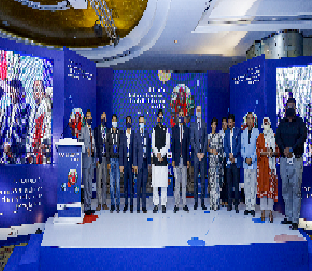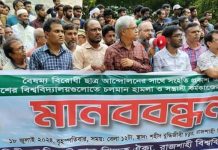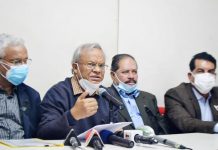[Dhaka, 23rd March, 2021] United Nations Capital Development Fund (UNCDF) organized a conference styled as “Leaving No Micro Merchants Behind in the Digital Era in Bangladesh” at The Westin, Dhaka and many other participants join online on March 23, 2021, to showcase the work and learnings gained from the Merchants Development Driving Rural Markets (MDDRM) initiative.
Facilitated and moderated by UNCDF, the one-day conference was organized in collaboration with its consortium partners (DNet, BDMS, and FBCCI), GIFT as the knowledge and communications partners, and Asiatic as the event partner.
Minister of State for Information and Communication Technology (ICT) Zunaid Ahmed Palak attended the event as the chief guest while Industries Secretary KM Ali Azam was the special guest. Maurizio Cian, Head of Cooperation of the Delegation of the European Union to Bangladesh, and Sudipto Mukherjee, Resident Representative, UNDP, Bangladesh, were guests of honor. The conference was moderated by Maria Perdomo, Regional Manager, Digital Hub for Asia, Inclusive Digital Economies, UNCDF.
Minister of State for Information and Communication Technology (ICT) Zunaid Ahmed Palak said, “MDDRM, a project of UNCDF was started in 2017, has overachieved with the help of micro-retail management in Bangladesh. With these interventions marginalized people have been recognized as the center of our economy.”
This conference was organized to explore emerging opportunities in the pandemic era, bring together global policymakers, academics, industry, and digital ecosystem leaders, and showcase the activities conducted under MDDRM (Merchants development driving Rural Markets) initiative.
One of the panelist, Ms. Tina Jabeen, CEO & MD, Startup Bangladesh said, “ We are establishing our startups with funding in finance, education and health sector.”
As per the latest Oxfam report, the top 1% of the population has more wealth than the bottom 6.9 billion people! The root cause of such inequality and exclusion is the lack of equal economic opportunity for people at the bottom of the pyramid – small merchants, farmers, and entrepreneurs. Fortunately, in the past few years, digital technologies have helped level the playing field by providing never before empowerment to the micro-merchants and retailers at the bottom-of-the-pyramid.
The next steps for policymakers and private sector stakeholders would be to build upon this trend of accelerated digitalization.
To support this endeavor, United Nations Capital Development Fund (UNCDF) has been implementing the MDDRM (Merchants development driving Rural Markets) initiative since 2017 and has reached out to 2 million retail micro-merchants in Bangladesh. This initiative is funded by the European Union. In partnership with DNet, BDMS, and FBCCI, it is working on spurring innovation for income diversification, business growth, and economic opportunities for micro-merchants in Bangladesh.
However, despite various initiatives undertaken by the government, development partners, and private sector entities, there are major constraints that need to be addressed, such as gender participation in retail businesses, digital use cases that address both financial and non-financial needs of enterprises, supply chain integration with larger companies, policy initiatives towards formalization and how to benefit the micro-merchants to recover from the pandemic.
All these issues and topics were underscored at the conference. Apart from these, panel discussions on ‘Digital Innovations for Micro-enterprises- how to connect non-financial services,’ ‘Agility and Resilience of Small business amidst and after the Pandemic,’ ‘Future of Women in Retail Business in Bangladesh,’ and ‘Policy Maker Recommendations: Government Actions to Facilitate cross-industry collaboration for innovative financing solutions for the last mile retail’ were also held at the conference.
Development partners, people from the private sector, including FinTechs, TechFins, FSPs, FMCGs, think tanks, consulting firms, INGOs, and representatives from all relevant government agencies were present at the conference.



















